- Home
- John Ellsworth
The Fifth Justice (Michael Gresham Legal Thrillers Book 10) Page 7
The Fifth Justice (Michael Gresham Legal Thrillers Book 10) Read online
Page 7
He looked up from the table, allowing his eyes to raise and look through the crowd, searching for the powerful man he knew would toy with a drink and pop sushi down his gullet.
Then his gaze swept by a twosome at the bar and kept moving left to the right. Then the man he’d just studied from behind swiveled on his stool. He caught Reno’s attention, so Reno returned to him and studied his face. Bingo! His target du jour.
Reno stood and made his way around the outside of the packed room, moving ever nearer to Marcel. Then he had to cross the dance floor which he did after waiting for a loud song from the quartet of mellow rockers. He kept his eyes fastened on Marcel—rather, Marcel’s backside, as the man had swiveled back around on his stool and hunched to the bar, a woman to his left and a woman to his right. It impressed Reno: Marcel seemed to carry on two conversations at once with two women who didn’t seem to know each other. Reno backed around the sushi bar, choosing this piece of rice and fish or that piece of rice and onion, none of which he ever put into his mouth for he hated raw fish.
Then he was back-to-back with Marcel. He drew a deep breath and eased the pistol from its holster. It was small enough—a Glock 26—that he could palm it and he did, turning, turning, inching the gun closer until the muzzle was at Marcel’s ear. Just as he squeezed the trigger, the woman to Marcel’s right saw what was happening and screamed, causing Marcel to turn at the last improbable second and receive the bullet forward of his left ear. The impact of the hollow point tearing into his skull knocked the investigator sideways on his stool, and he continued down, falling off to his right and landing on his back, staring at the ceiling, unmoving.
Reno was gone in a flash, ducking through the crowd and the uproar and retracing his steps. Down the hallway he dashed with his face averted from the security cameras, relieved there was no one at any point to witness his run for the parking lot. He swung his body down the stairway in two leaps and jumped for the door. Outside he forced himself to walk toward his SUV, careful to draw no attention to himself. He’d left the vehicle unlocked. Once inside, he removed the cap and tossed it into the backseat. The huge engine caught, and Reno made a right into the lot’s main lane. Once again on Carondelet Plaza an oncoming EMT truck passed him, lights flashing and siren blaring, racing to save a man that Reno could only believe was dead.
With great care, he drove away from the area, pulling back onto the freeway and heading for Illinois.
He merged with the eastbound traffic, became invisible to all, and disappeared back inside himself, already thinking about Saturday night and the boat party.
Crossing the bridge, the thought occurred to him he had just taken down the last remaining impediment to his locating the missing woman Michael Gresham had been asking about in court. He wanted her, wanted to locate her and finish what he started years ago.
His plans for his one-time victim even beat out the boat show plans. Chicago would have to wait. Tomorrow he would find her.
He knew just where to look.
Chapter 15: Michael Gresham
Detective Brian O’Bannon of the St. Louis PD called me after nine the night someone shot Marcel.
“Michael Gresham?”
“Speaking,” I said. “Who’s this?”
“Detective O’Bannon, St. Louis PD. Do you know one Marcel Rainford?”
“Yes, he works for me.”
“He’s your employee?”
“Yes, why?”
“Someone has shot him. I’m here at the Ritz-Carlton. Are you in the area?”
“I’m in Chicago. I can be there in four hours.”
“I’ll still be here. Show your ID to the officer watching the police tape. He’ll point me out, Mr. Gresham.”
“See you around one, one-thirty.”
Fifteen minutes later, I was kissing Verona goodbye and stuffing my suitcase and briefcase into my car. She was leaving for Saint Petersburg the next day; the kids would be fine with their nanny. Heading out for St. Louis that night required no thinking about Verona, the kids, or the law practice. My best friend had been shot. I was too torn up to do much else besides stop for a gasoline fill-up and drive like hell for the Show-Me state.
I made St. Louis just after one a.m. and headed for the banquet room.
Pandemonium. Cops were everywhere; women were walking past with tears in their eyes; men in business suits and evening clothes were darting their eyes all around at everyone and everything as if frightened. My stomach clutched because I knew something had gone very wrong nearby.
I followed a police officer who just entered through the front doors. He headed down the hall beyond the main desk. At the Lobby Lounge, he walked right by the officer guarding the door and went inside.
I pulled out my driver’s license and bar card and displayed them at the door. The cop looked me up and down, comparing my face to the picture ID. Satisfied, he turned around and pointed out a sizable fortyish man wearing blue jeans, a blue button-down shirt, and no necktie. The mandatory Glock and detective shield were clamped to his belt. He looked busy, talking to this one and that as I set off across the room.
“Detective O’Bannon? I’m Michael Gresham.”
“Mr. Gresham. Follow me, please. We need to talk.”
“Just tell me. Is Marcel okay? Or—or—”
“Unknown. They took him to Barnes Hospital with a head wound. Whether he survived or will survive is anyone’s guess. For now, I’m treating it as a homicide, though.”
My heart was flip-flopping in my chest. At “homicide,” it felt like a stroke was imminent my pulse was pounding so hard.
“What do you know so far?”
“The wits all have it that your employee was seated at the bar talking to someone. A man wearing a Cardinals baseball cap sauntered up behind, placed a gun beside his head, and pulled the trigger. One shot, that was it. They took him to Barnes.”
“I’m headed for Barnes, Detective. You have my number.”
Barnes-Jewish Hospital was on the other side of the zoo. I got back in my car and tromped it, praying all the way there. I couldn’t imagine a world without my best friend in it. It was all I could do to keep it under seventy.
I parked just beyond the ER entrance and hit the ground running.
ER directed me upstairs. With the help of a few employees, I located the MRI operating suite. At the reception window, I drew suspicious looks and noncommittal answers. They did not understand who I was or what I wanted; for all they knew I was the shooter come back to finish the job.
A nurse wearing a surgical cap and booties appeared. I gripped the shelf beneath the reception window and asked, “What about him? Did he survive?”
Same answer. “Please have a seat, and we’ll call you over when we hear something.” Someone else added, “Please tell security you’re not family but you are the employer and that he was working for you when he was shot. That will help.”
“Will do. Thanks so much.”
Ten minutes later, two gentlemen in dark suits appeared and approached me with disapproving looks. They had me produce ID, interviewed me, conferred with their iPad and returned. It appeared they had checked me out and all was well. They would give me information and I’d be allowed to see Marcel—if he were even still alive, which I didn’t know even by then.
I pressed my hands together and got out of my chair, drying my palms on my pants as I returned to the reception desk.
“You’re cleared for information,” the same woman told me.
“For God’s sakes, I’m dying here. Is Marcel alive?”
“He’s alive. He’s in recovery. I’ve asked one of his surgeons to come out and speak with you. You can have a seat again, Mr. Gresham. They’ll come to talk to you at the first opportunity.”
I returned to the same chair. By then I was wringing my hands and staring holes in the door that led back onto the neurosurgery ward. While I sat there, I called Verona and let her know. I’m the husband who checks in with his wife only when there’s rea
l news. She was shocked and her voice broke. We all loved Marcel like family.
An hour went by before the doctor appeared. He was bouncy, animated, and talked with his hands, explaining all he‘d done for my friend. His name was Dr. Stuart, African-American, maybe forty-five years old, wearing scrubs, a surgery cap, and lavender running shoes. A beard and gold earring completed his look.
“He’s alive, and he’s in recovery”—the first words he said.
Introductions followed.
“Your friend suffered a gunshot wound. The bullet entered on the left side of his face and traveled through his jaw, his mouth, exiting on the right, below his first upper molar. There was a ton of damage. I ran tests, did my neuro studies, all while the maxillofacial doc repaired the wound.”
“What about brain damage?” I couldn’t wait to get it out.
“The MRI studies were conclusive. It appears your friend is a very, very lucky man. There is no evidence of any brain injury.”
I had to turn away to compose myself. Answered prayers!
I couldn’t thank Dr. Stuart enough. It embarrassed the neurosurgeon, my profuse outpouring. He extricated himself after about ten minutes of talk, turned, and disappeared back the way he had come. I could see Marcel once they had him moved from recovery to his room. There was a police presence; Marcel was under guard.
Again the people at the window directed me back to my seat, promising that I’d be called. So I phoned Verona again, reporting what I knew. She cried—wept—while I tried to ignore the tears in my eyes. It was late, and the whole thing had exhausted me even though all I’d done was wait and stew. That was the thing though. I’m older, and this kind of action takes its toll. Plus, I’ve suffered a mini-stroke or two myself, and I’m susceptible. We said our goodbyes, and I put my phone away. Just as I was sure I’d never get settled in the chair again after hours on my tailbone, the receptionist waved me over.
“You can go back. Third door on your left, Mr. Gresham.”
It shocked me, what I saw after the police officer posted at the door to Marcel’s room had cleared me. Head swathed in bandages, holes for the eyes to peer out, turning weakly toward me when I said, “It’s Michael, Marce.”
Marce: my term of endearment for this incredible man.
Tubes running into his nose and mouth, unable to speak, a weak wave of two fingers.
He was alive, and he knew me.
That was all that mattered just then.
That was all that mattered, except it now fell to me to go forward with our search alone.
I was game.
Chapter 16: Chloe Constance
Chloe signed a release allowing the hospital to put her picture in several newspapers to connect with someone who knew her. The court approved the release, and they sent her picture out.
Reno spotted her in the Alton Daily News. The find made him laugh and slap the kitchen table: they had all but handed her to him.
“Got you!” he cried out. So she wasn’t dead. But he would get her back before anyone else did. Alton was far away from Chicago, and he doubted Chloe Constance would make the newspapers up there.
He would need to plan how he would get custody of her. He knew what would happen when he went to claim her. There would be police inquiries and an internal investigation by the hospital followed by the hospital requiring him to show unique knowledge of the woman in the paper. They wouldn’t just turn her over to anyone who came around asking. He would need to steal her hospital file to show his possession of inside information that only a husband would know. The hospital records would tell things about her that no one could know without being inside the woman’s inner circle. Tattoos, scars, colorations, dental marks, and repairs—these were the things by which he could prove she belonged to him, and by which he could show he had known her since before the accident. Plus, he would get a marriage license once he had got all her records. The license would fit her details—such as they were—just right.
Reno began by visiting the hospital. He required staff cooperation. He wandered the first-floor hallway, following the yellow footprints painted on the floor until he arrived at the suite of offices marked RECORDS. Inside he stepped.
It was busy. No one came to the counter to assist him. Excellent. It would give him time to choose a likely candidate to cooperate with him.
It didn’t take him long. Her name tag said Vicki, and she was all of five-four, if even that, on the chubby side, with thick lips and long black lashes that jittered and jumped when she waited on someone. She was new or lacked confidence in her abilities, so he focused on her. She would be the most amenable to his friendliness.
He stepped into the hallway, planted his back against the wall, and waited. It was 11:40 a.m. He knew she would take a lunch break in the next hour. He only hoped she would leave the office for the cafeteria or somewhere off the hospital grounds where he could follow.
Sure enough, at 11:59 a.m., she emerged. And—he couldn’t have planned it better—she was alone. In one hand she clutched a brown paper lunch bag; in the other, she carried her phone. She checked texts as she scurried away down the hall. Her plan was clear: a table in the cafeteria before the noon bunch swept in and took all the right places to sit, followed by a thirty-minute session with her favorite iPod sounds. Reno figured she loved Imagine Dragons and Taylor Swift. They were dominating the airwaves so she would be onboard. Reno’s impression of Vicki was a young woman who was making payments on a used Corolla, getting free makeovers at Macy’s and working up the nerve to ask out a man in her office. Money would resonate with her.
He lurked nearby as she opened her lunch bag, took a bite out of a white bread sandwich then chewed along to her tunes. Reno sauntered up and stood beside her, a friendly smile on his face below a puzzled look. He was looking lost.
Her mouth full of egg salad, Vicki looked up. Reno continued looking down at her. “Excuse me,” he finally said.
She removed an earbud from one ear. “What was that?”
Reno gave her his shy look. “I said I’m sorry to interrupt.”
“Oh, it’s okay. I’m just eating.”
“Do you know where the records department is?”
“I do. I work there.”
Reno motioned to the chair across from her round, two-seater table. “May I?”
“It’s a free country.”
“Thank you. Anyway, I need help with a woman’s records.”
Vicki looked at him, her head tilted to the side, her eyes narrowed. “You must come over to the office and fill out a request form. You need a PR form. Then we can help you. Is it your wife?”
“Yes. I saw her picture in the paper.” Every other week the hospital would run pictures of Jane Does in the paper.
“What’s her name?” Vicki inquired.
“Chloe Constance.”
“What’s she to you?”
“My wife. At last, I’ve found her.”
“How did you lose her?”
“She disappeared one afternoon. She was going shopping for antiques, and I never saw her again. Here’s her picture from the newspaper.”
That caught Vicki’s interest, and she leaned toward him, her elbows resting on the table as she studied the picture. “Oh, I know a little about her. She’s been here for a while.”
“Yes, I even came to this hospital several weeks ago, but nobody could help.”
Vicki’s expression turned suspicious. “I find that hard to believe. They treat Jane Does with the greatest care. You must have met up with someone who was having a rotten day.”
“I don’t know. But now I’m heartsick, thinking my beautiful wife might have been here the entire time, and I didn’t know it. I’m thinking of a lawsuit.”
Vicki set her egg salad aside. “There’s no need for a lawsuit. We can help you get reconnected with little ado, I’m sure.”
“You can?”
“Yes. You must fill out the Patient Request, the PR. I can help with that. But be careful wh
en you fill it out. It asks specific questions to prove you’re who you say you are and she’s who you say she is.”
“I wouldn’t have it any other way. But can you help me with those answers, so I don’t lose out on my chance to get my wife back?”
“I can give you the form. You must fill it out though. I can’t do that for you.”
“That’s a shame. I’m thinking of seeing a lawyer, then. Someone who can cut through the red tape.”
“Oh, there’s no red tape.”
“Can you let me see her records first, just to be sure she’s my wife?”
“Sorry, I can’t do that. The records have personal information in them. They’re protected by HIPAA.”
“What’s HIPAA?”
“Health Insurance Portability and Accountability Act. It protects patient rights.”
“What if I contributed to the hospital? Would that help with the red tape?”
When Vicki smiled, there was salad wedged between her teeth. She ran her tongue over the spot. She looked at the clock. She only had five minutes of lunchtime left and Reno was taking it.
“What if I contributed to you?” he said without waiting for an answer to the earlier question. “Say I paid you five thousand dollars for her file?”
Vicki inhaled, choking on the sandwich bits she’d been chewing. She raised an arm and swallowed a mouthful of milk. The coughing subsided.
“Jesus,” she said, her eyes darting around. “Did you offer me five thousand dollars for a patient’s records?”
“I did.”
“I should turn you in.”
“But you won’t. Five thousand dollars is an enormous down payment on a new Mustang convertible. I’ll bet you want one of those.”

 Girl, Under Oath (Michael Gresham Series)
Girl, Under Oath (Michael Gresham Series) The Fifth Justice (Michael Gresham Legal Thrillers Book 10)
The Fifth Justice (Michael Gresham Legal Thrillers Book 10) Michael Gresham (Book 5): Sakharov the Bear
Michael Gresham (Book 5): Sakharov the Bear Voices In The Walls: A Psychological Thriller (Michael Gresham Series)
Voices In The Walls: A Psychological Thriller (Michael Gresham Series)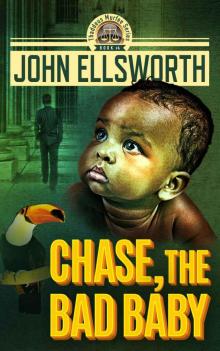 Chase, the Bad Baby: A Legal and Medical Thriller (Thaddeus Murfee Legal Thriller Series Book 4)
Chase, the Bad Baby: A Legal and Medical Thriller (Thaddeus Murfee Legal Thriller Series Book 4)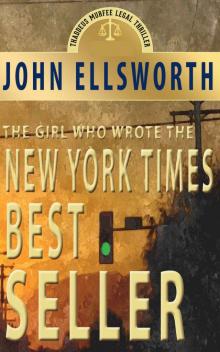 The Girl Who Wrote The New York Times Bestseller: A Novel (Thaddeus Murfee Legal Thrillers Book 8)
The Girl Who Wrote The New York Times Bestseller: A Novel (Thaddeus Murfee Legal Thrillers Book 8) The Defendants: Crime Fiction & Legal Thriller (Thaddeus Murfee Legal Thriller Series Book 1)
The Defendants: Crime Fiction & Legal Thriller (Thaddeus Murfee Legal Thriller Series Book 1) Hellfire (Sisters In Law Book 2)
Hellfire (Sisters In Law Book 2) A Young Lawyer's story
A Young Lawyer's story Annie's Verdict (Michael Gresham Legal Thrillers Book 6)
Annie's Verdict (Michael Gresham Legal Thrillers Book 6) Legal Thriller: Michael Gresham: Secrets Girls Keep: A Courtroom Drama (Michael Gresham Legal Thriller Series Book 2)
Legal Thriller: Michael Gresham: Secrets Girls Keep: A Courtroom Drama (Michael Gresham Legal Thriller Series Book 2)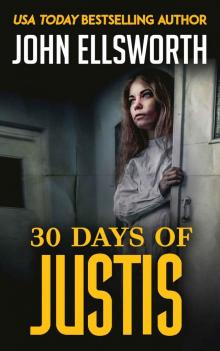 30 Days of Justis
30 Days of Justis Sakharov the Bear (Michael Gresham Legal Thrillers Book 5)
Sakharov the Bear (Michael Gresham Legal Thrillers Book 5)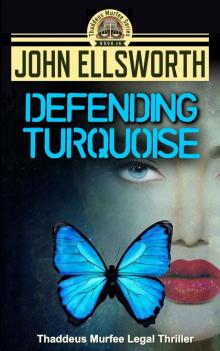 Defending Turquoise (Thaddeus Murfee Legal Thriller Series Book 5)
Defending Turquoise (Thaddeus Murfee Legal Thriller Series Book 5)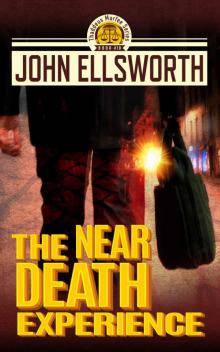 The Near Death Experience (Thaddeus Murfee Legal Thriller Series Book 10)
The Near Death Experience (Thaddeus Murfee Legal Thriller Series Book 10)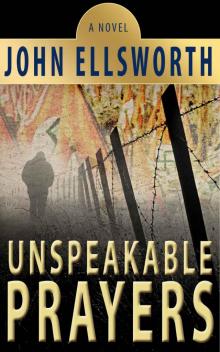 Unspeakable Prayers: WW II to Present Day (Thaddeus Murfee Series of Legal Thrillers)
Unspeakable Prayers: WW II to Present Day (Thaddeus Murfee Series of Legal Thrillers)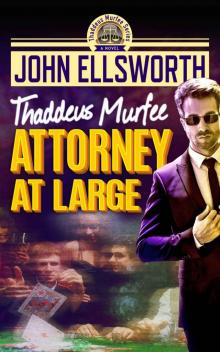 Attorney at Large (Thaddeus Murfee Legal Thriller Series Book 3)
Attorney at Large (Thaddeus Murfee Legal Thriller Series Book 3) The Law Partners (Michael Gresham Legal Thriller Series Book 3)
The Law Partners (Michael Gresham Legal Thriller Series Book 3) Annie's Verdict
Annie's Verdict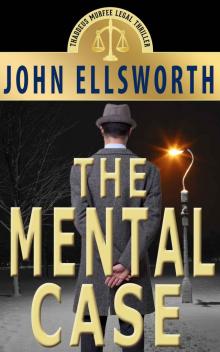 The Mental Case (Thaddeus Murfee Legal Thriller Series Book 6)
The Mental Case (Thaddeus Murfee Legal Thriller Series Book 6)